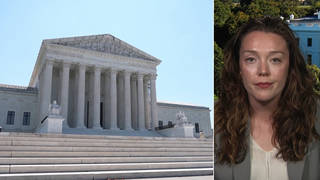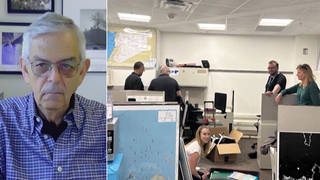HeadlinesNovember 17, 2015
Russia Confirms Bomb Brought Down Plane, Killing 224
Russian authorities have confirmed a bomb brought down a passenger plane over the Sinai Penininsula in Egypt last month, killing all 224 people on board. The self-proclaimed Islamic State had claimed responsibility for taking down the plane, calling it retaliation for Russia’s airstrikes in Syria. Russian officials say an examination of the wreckage confirms an “improvised explosive device” went off soon after the plane departed Sharm el-Sheikh en route to St. Petersburg. Russian President Vladimir Putin vowed to intensify Russian airstrikes in Syria in response to the bombing.
Russian President Vladimir Putin: “The murder of our people in Sinai is one of the bloodiest by the number of victims of such crimes. We won’t wipe off tears over our hearts and souls. It will stay with us forever. But that will not prevent us from finding and punishing the perpetrators.”
French President Seeks Expansion of State Power After Attacks
France and the United States have also ramped up airstrikes against ISIS in response to the attacks in Paris that killed 129 people Friday. In France and Belgium, authorities have carried out a wave of raids in search of a suspect who escaped. French President François Hollande has requested a sweeping expansion of state power, calling for measures to ease police raids without a warrant, allow the government to strip citizenship from dual passport holders convicted of terrorism, and expand the current state of emergency for three months. Addressing Parliament, Hollande sought changes to the French constitution.
French President François Hollande: “I honestly believe that we need to update our constitution to allow the authorities to act within the law against the terrorism of war.”
Britain to Hire 1,900 New Spies After Paris Attacks
French President François Hollande has also indicated he could seek a further expansion of spying powers, beyond new laws adopted since the Charlie Hebdo newspaper attacks in January. Meanwhile, British Prime Minister David Cameron has vowed to fund an additional 1,900 officers at the spy agencies MI5 and MI6.
CIA Director Claims Leaks Made It Harder to Find Terrorists
In the United States, CIA Director John Brennan invoked the Paris attacks to defend mass surveillance. In apparent reference to disclosures by NSA whistleblower Edward Snowden, Brennan suggested revelations about mass spying have made it harder to find terrorists.
John Brennan: “In the past several years, because of a number of unauthorized disclosures and a lot of hand wringing over the government’s role in the effort to try to uncover these terrorists, there have been some policy and legal and other actions that are taken that make our ability, collectively, internationally, to find these terrorists much more challenging.”
Civil liberties advocates disputed Brennan’s claims. Jameel Jaffer of the American Civil Liberties Union said: “As far as I know, there’s no evidence the French lacked some kind of surveillance authority that would have made a difference. When we have invested new powers in the government in response to events like the Paris attacks, they have often been abused.”
Governors of 27 U.S. States Refuse to Accept Syrian Refugees
In the wake of Friday’s attacks in Paris, governors of at least 27 U.S. states have said they will not accept Syrian refugees. A Syrian passport which appears to be fake was found near the body of one of the Paris attackers, whose fingerprints matched someone who passed through Greece and the Balkans. All the attackers identified so far are European nationals.
State Dept.: Refugees Subject to “Highest Level of Security Checks”
The Obama administration has said it still plans to accept Syrian refugees. State Department spokesperson Mark Toner said refugees are intensely vetted.
Mark Toner: “You know, it’s also important to emphasize that these refugees are subject to the highest level of security checks of any category of traveler to the United States. It’s an interagency or multiagency screening process. It involves the National Counterterrorism Center, the FBI’s Terrorist Screening Center, the Department of Homeland Security and the Department of Defense. And particular to Syria, these Syrian refugees go through an extra, yet additional, forms of security screenings.”
Environmentalists Plan to Protest in Paris Despite Crackdown
Environmentalists are vowing to press ahead with peaceful protests planned to coincide with the United Nations climate talks in Paris, which begin in just under two weeks. French Prime Minister Manuel Valls has said side events, including rallies, will be canceled. But in a statement, Nicolas Haeringer, France campaigner for the environmental group 350.org, said: “We fully share [French authorities] concerns about public safety—just as we fully oppose any unnecessary crackdowns on civil liberties and minority populations. We can think of few better responses to violence and terror than this movement’s push for peace and hope.” Democracy Now! will travel to Paris to cover the two-week talks and the protests.
Stanford Students Launch Sit-in for Fossil Fuel Divestment
Stanford University students have surrounded the president’s office and vowed to remain in place until the university completely divests from the fossil fuel industry. Last year, in response to student protests, Stanford agreed to divest from coal companies. But the students have now called for Stanford to divest from all fossil fuels, including oil and gas.
Texas: Tornado Levels Halliburton Plant, Causing Chemical Leak
In Texas, a tornado has leveled a Halliburton plant in Pampa, causing a massive chemical leak. No one was inside the building at the time. Authorities have not identified the chemical involved.
Minnesota: 51 Arrested Protesting Police Killing of Jamar Clark
In Minneapolis, Minnesota, more than 50 people were arrested overnight as hundreds of protesters shut down a section of highway to protest the police shooting of 24-year-old African American Jamar Clark. Police said Clark was shot after a scuffle with officers who responded to a report of an assault. But multiple witnesses have said Clark was shot while handcuffed.
Tito Wilson: “The guy was pinned down on the ground. He was not moving. He wasn’t fighting. He wasn’t screaming. Nothing. And next thing we know, maybe a minute or whatever after watching it, the gun went off.”
Tequila Dillon: “They put his hands behind his back, they slammed him on the ground, and they shot that man in his head.”
Jamar Clark was reportedly taken off life support on Monday night. In response to mounting protests, Minneapolis Mayor Betsy Hodges called for a federal investigation into the shooting. The protesters have continued to demand the release of video footage and the names of the officers involved.
California: Video Shows Deputies Beating Man on the Ground
In news from California, video released by the San Francisco Public Defender’s Office shows two Alameda County sheriff’s deputies beating a man as he lies on the ground. The security camera footage appears to show Stanislav Petrov, a suspected car thief, stopping and appearing to surrender, right before officers tackle him to the ground. The officers then punch Petrov and whale on him with their batons. Public Defender Brendon Woods compared the beating to the 1991 Los Angeles Police beating of Rodney King and called for a federal probe.
Report Faults Baltimore Police for Response to Freddie Gray Protests
A new report has criticized the Baltimore Police Department’s handling of uprisings following the death of Freddie Gray in police custody. The independent review conducted by the Police Executive Research Forum, found inadequate planning and training, confusion over the chain of command and a lack of clear policies for making arrests.
Georgetown Renames Buildings Named for Presidents Tied to Slavery
Georgetown University has agreed to rename two buildings that honor past presidents with ties to slavery, following protests against racial injustice on campus. Mulledy Hall and McSherry Hall are both named for former Georgetown presidents who facilitated the sale of slaves to help pay down the school’s debt in the 1830s. Georgetown is among the schools nationwide where students have rallied against campus racism.
Utah: Judge Removes Himself from Lesbian Foster Parent Case
And a Utah judge who came under fire for removing a foster child from a lesbian couple’s home because of their sexual orientation has removed himself from the case. Juvenile Court Judge Scott Johansen had initially removed the baby from the same-sex couple, saying she would be better off with heterosexual parents. Following protests and calls for his impeachment, he later reversed the order.
Most popular
- 1
- 2
- 3
- 4
Non-commercial news needs your support
Please do your part today.











Media Options